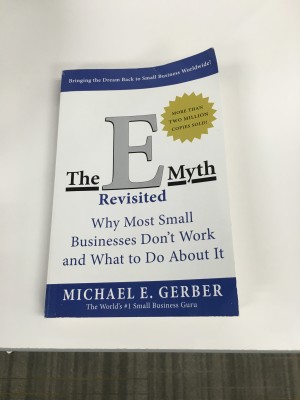Lessons from
- August 21, 2016
- / Quint Studer
- / training-development,quint-studer

The E-Myth Revisited by Michael Gerber.
In my work with the Studer Community Institute, one of the things I look forward to is our roundtable discussions with area business leaders.
We share challenges. We share stories. We brainstorm solutions.
Some of those leaders also share some resources they’ve used to find success. It could be an article, a web site or a book.
And look, not that I’m biased, but when people dole out book recommendations, I tend to prefer (OK, hope) that they suggest one of mine.
A few months back, both Susan Campbell, owner of Susan Campbell Jewelry, and Tim Shoop, owner of Digital Boardwalk, mentioned the book “The E-Myth Revisited.” Perhaps they were mistaken because it was not a book from yours truly, but instead author Michael Gerber.
I said I would read it, but I wasn’t enthusiastic. I write about business, about workplace culture, about leadership, what do I need to learn? Perhaps I was being too sensitive. Immature, even.
We left the meeting with the suggestion that everyone in the group read E-Myth and discuss it at the next roundtable.
Procrastinating due to my dearth of enthusiasm, I bought the book about two days before the next meeting. I knew it wouldn’t be that good. (As Herbert Spencer said, "There is a principle which is a bar against all information, which is proof against all arguments and which can not fail to keep a man in everlasting ignorance — that principle is contempt prior to investigation. Guilty was I.”)
But there was a big problem. I was enjoying it. I found ways I could have made my businesses better. This was a great book, and I could clearly see the value Susan and Tim found in it.
That next roundtable discussion was as productive as I can remember, and since that session I recommended this book to others constantly.
For me, I had three key takeaways:
— The majority of people who start a business do so because of their specific expertise in a particular area. A baker starts a bakery. A plumber starts a plumbing company. This is called technical expertise. But you can’t just have technical expertise to run a good business. To be successful you also need to have good management and entrepreneurship, which is attracting customers.
No matter which of the three areas of expertise the owner brings — technician, manager or entrepreneur — it is vital to have all three skills covered. Seeing most are the strongest as a technician, when stress surfaces in the business, they go back to what they are most comfortable. But that may not be the skill needed to keep things afloat. In the book, Gerber used the bakery example: The owner loved to bake, but when things got stressful they focused on the kitchen and baking. The greatest need was outside the kitchen.
— Franchise operations outperform independent companies. This really hit home for me. With small businesses, the owner is always there. So everyone gets very dependent on the owner. What happens? This wears down the owner. And because that owner is saddled with so much responsibility, the employees don’t develop. And in some cases, no standards are set for how things are run.
Let loose your inner entrepreneur
No matter where you are in the lifecycle of entrepreneurship, EntreCon 2016 is the place for you to get all of the advice, resources and inspiration you need to make the next step of your journey as an entrepreneur worthwhile.
The two-day conference, hosted by the Studer Community Institute, is Nov. 3-4 in downtown Pensacola.
For details and to register, click here.
One reason franchises (i.e. McDonald’s, Wendy’s etc.) outperform non-franchise operations is that franchises have strong, installed standard operating procedures. They must in order to be able to grow the franchise. That means the staff and products are more consistent.
Since reading E-Myth, standard operating procedures have been top of mind for me. These procedures help assure the company runs well even when the owner not there. This also provides the time an owner needs to plan the next steps to improve performance or ways to grow the company.
— Eighty percent of startups don’t make it a year; of those that survive the first year, 80 percent won’t make it five years. If I had known the odds of failure were that high a couple decades ago, I am not sure I would have left a relatively secure position to start my own company.
So to all the business owners, thank you for your courage, your fortitude and your skill in starting, operating, growing a business and for creating jobs.
And when you’re done reading E-Myth, I have a couple other book suggestions. And I promise they won’t be mine.

 CivicCon launches with a look at good growth in cities
CivicCon launches with a look at good growth in cities
 Building stronger brains one baby, one parent at a time
Building stronger brains one baby, one parent at a time
 SCI debuts commercial on Early Learning City
SCI debuts commercial on Early Learning City
 Entrecon: World class speakers and an opportunity to sharpen skills
Entrecon: World class speakers and an opportunity to sharpen skills
 PYP Quality of Life survey 2017
PYP Quality of Life survey 2017
 EntreCon Pensacola 2016: A look back
EntreCon Pensacola 2016: A look back
 Leadership tip: getting better employee takeaways
Leadership tip: getting better employee takeaways
 Leadership tip: be interested instead of interesting
Leadership tip: be interested instead of interesting
 Leadership tip: delivering difficult messages
Leadership tip: delivering difficult messages
 Brain Bags boost Arc, Early Childhood Court programs
Brain Bags boost Arc, Early Childhood Court programs